Yesterday I wrote a long piece on the JustMeans site, where Corporate Social Responsibility (CSR) folks hang out, about the ethical implications of a recent publication of the “2010 Best Corporate Citizens” by a group called the CRO*. To give you a taste of the list’s value, Exxon is number 11 in the CRO rankings. (correction it is 51, HP, Intel and General Mills are 1,2 and 3 in the 2010 list, it was no. 11 in the 2009 list)
But CRO is just one of many list makers.
JustMeans member, Madeline Ravich, did an excellent comparison of these lists that are proliferating (the CRO one was not included as it was just published but will be in her next review) to include 2009 Best Corporate Citizens, 2009 Most Ethical Companies, 2009 Newsweek Green Rankings (top 100 companies), 2010 Global 100 by Corporate Knights, and the 2010 Global ESG 100 by RiskMetrics Group. She notes: “It turns out, however, that there is, in fact, NO COMPLETE CONSENSUS. Upon double-checking my work, I figured out that the one company that I had thought made all five lists was, in fact, not mentioned in the Most Ethical Citizens.”
So why is this list making and shaking so important? Well, two reasons, both of them related to what I am calling values-washing.
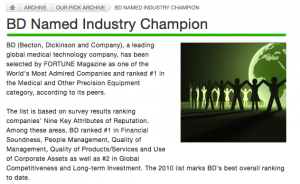 First, very large corporations know the messaging of social responsibility has become very valuable because customers, especially younger ones, are showing preferences for buying from companies with sustainability related values – environmental and social – as well as those companies with green products. Advertising products as green when they are not is called greenwashing. What I am talking about I will call values-washing. These lists establish credibility for those practicing both green and values-washing.
First, very large corporations know the messaging of social responsibility has become very valuable because customers, especially younger ones, are showing preferences for buying from companies with sustainability related values – environmental and social – as well as those companies with green products. Advertising products as green when they are not is called greenwashing. What I am talking about I will call values-washing. These lists establish credibility for those practicing both green and values-washing.
The lists and buzz that surrounds them create confusion in the marketplace among consumers, as do the many conferences and consortiums targeting the professional class that are themed around sustainability, corporate responsibility and good citizenship.
Recent research from the New Scientist shows that there is a huge gulf (their word) between perception and reality on the part of consumers. They cite as one example the media firm Discovery Communications: its environmental impact, per dollar earned, is almost indistinguishable from TV and movie giant Viacom. Yet Discovery has a stellar green reputation that Viacom does not enjoy – which could be due to Discovery’s content, which includes Animal Planet TV and websites such as TreeHugger. Why does this not surprise me?
It was obvious to me a few months down the road of building EarthSayers.tv, the voices of sustainability, that the sponsors of the site had to be drawn from credible, and as I later discovered, certified ‘for benefit organizations’, or become, unwittingly, a values-washing site.
Secondly, there is the Supreme Court decision that will allow Corporations to throw even more money at creating sustainability shell organizations, and here again lists, conference sponsorships, and awards are all very important to establishing credibility for sustainability-related claims and statements. Organizations representing “high powered boards” are already using the Internet very effectively to steer our citizens searching for information to networks of professionals such as the CRO one above, but also carefully embedded elsewhere in Facebook, even in citizen actions sites such as Care2.
Seeding the Web with free speech
This AMA notice suddenly appeared when I was about to sign a petition for reducing antibiotics in our farm animals on the Care2 site. Note it is not the AMA’s Patient Action Network.

Part of seeding includes establishing groups on magazines such as Ode and Eons, not to mention social networks such as Facebook and LinkedIn. There is blogging on Salon.com et. al with quality content coming from the growing ranks of “journalists-turned-PR-Pros.” Seeding the Web is easy and not as expensive as TV or print campaigns and one can be less transparent. How do I know this? Because I have been seeding the Web for EarthSayers.tv and know first hand how easy it is. Because I have years of online marketing experience and know the importance of search. Because research shows the top results or page one of organic results is generally only what we see. This is especially true for children. And because organic listing are more trusted than paid ones. Page one of Google Search Results is the single net impression for sustainability.
We have made placing EarthSayers in the top three results of a search on sustainability our number one objective. We are now in the top for ‘voices of sustainability’ and working towards top ranking on the term, sustainability. We are blogging, twittering, creating groups, and have gone all organic.
Here is the search playing field.
Look at trends for sustainability search, 2009, and you see environmental sustainability and sustainable are top ranked.
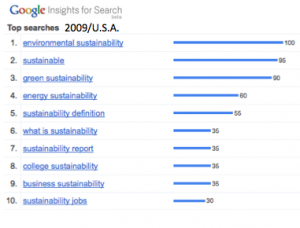 But note “rising searches” in the same period finds conferences and consortiums easing out environmental with Walmart in no. 5 position. Worldwide it’s SAP in no. 2 position with Walmart nearly edging out environmental sustainability. Search results on the term, sustainability used to be primarily Wikipedia, the EPA and a variety of B2B research and consulting companies.
But note “rising searches” in the same period finds conferences and consortiums easing out environmental with Walmart in no. 5 position. Worldwide it’s SAP in no. 2 position with Walmart nearly edging out environmental sustainability. Search results on the term, sustainability used to be primarily Wikipedia, the EPA and a variety of B2B research and consulting companies.
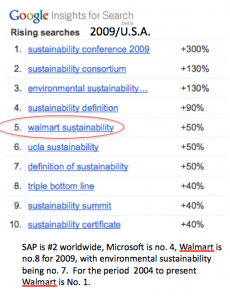
As my dad would have said, it’s a horse race. What do you see today? This ranking has appeared only beginning this week:

Perfection
What I hear all the time about our quest for sustainable lifestyles at home and in our work is that “no one is perfect.” But that obscures the fact that individuals at work and in their homes should act ethically. What should be placed front and center on the Web is not perfection, but ethics and the core values that earn our respect and business. Values-washing is easy and it’s not ethical.
This is not to say that the companies referenced above or in the myriad of lists or at business conferences do not have green products or sustainability initiatives. What I am saying is that the landscape of sustainability should not be defined solely by large Corporations or by the folks who remain anonymous on the much-referenced Wikipedia. It is this belief that fueled our investment in EarthSayers.tv, the voices of sustainability, to show value and not be the storyteller, but the medium for the sustainability stories. The Web supports hearing directly from the thought leaders representing all sectors of our economy as well as citizens from all walks of life, but it is a horse race and we need sponsors to keep in the running. For our part at EarthSayers.tv, we are seeking sponsorship from companies that are certified as “for benefit.” We do not want to compromise our values, as our reputation is what “brand” is all about.
Let’s hope I am successful at gaining the financial support of the companies and individuals out there who are true sustainability advocates and sponsor EarthSayers.tv, the voices of sustainability.
Note:
CRO is “Led by its high-powered 16-member Board of Governors and in partnership with the 6,900-company NYSE Euronext, the fast-growing Corporate Responsibility Officers Association…” and unlike the site, Business Ethics, the Magazine of Corporate Responsibility, is not affiliated with any organization offering credibility such as Open MIC which values “diversity and competition, creativity and innovation, openness and transparency.”
 How is that I asked? I emailed several friends in San Francisco and asked them to do a search. Similar results to mine, but no Portland. How about Berkeley?
How is that I asked? I emailed several friends in San Francisco and asked them to do a search. Similar results to mine, but no Portland. How about Berkeley?![]() One can put in to any search a geo parameter, e.g. Portland or a zip code, but in this case no such geo parameter was added. So how did the search engine know I’m Portland and my friend is San Francisco? I cleaned by cache, removed Google cookies. I have recently removed my city from my Google profile. No change so far. My money, though, is on the profile information in Google.
One can put in to any search a geo parameter, e.g. Portland or a zip code, but in this case no such geo parameter was added. So how did the search engine know I’m Portland and my friend is San Francisco? I cleaned by cache, removed Google cookies. I have recently removed my city from my Google profile. No change so far. My money, though, is on the profile information in Google.






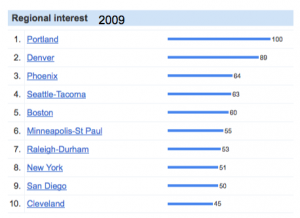
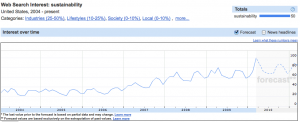
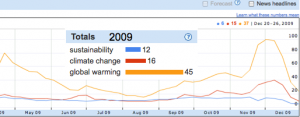

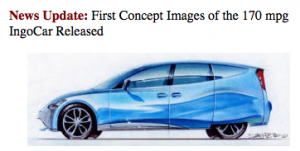

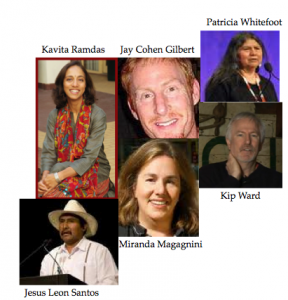
 Newsweek released its
Newsweek released its 
 *The GREEN POLICIES SCORE, derived from data collected by
*The GREEN POLICIES SCORE, derived from data collected by  *The REPUTATION SCORE is based on an opinion survey of corporate social responsibility (CSR) professionals, academics and other environmental experts who subscribe to
*The REPUTATION SCORE is based on an opinion survey of corporate social responsibility (CSR) professionals, academics and other environmental experts who subscribe to